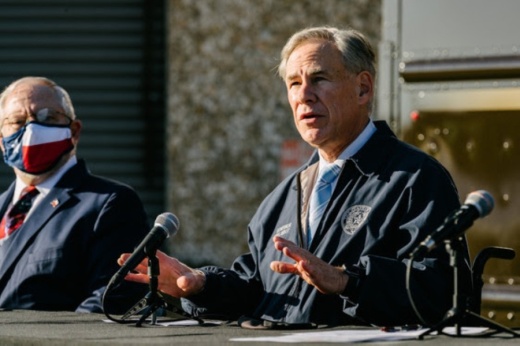Abbott, a harsh critic of how Austin has handled its homelessness challenges, said the issue of public camping would be addressed this legislative session, which opened Jan. 12 and will last through May 31.
“I do expect to announce a statewide plan to address homelessness that will include a ban on camping as well as other ideas to make sure that Texas will be able to effectively and aggressively address the homelessness situation,” Abbott said following a public safety roundtable discussion.
The comments come a day after Abbott threatened to step in and reinstate tighter camping restrictions in Austin if Austin City Council did not act.
Austin Mayor Steve Adler, who voted for the relaxed camping measures in 2019, told a local media outlet this week that the current rules in place around public camping are not working; however, he said the city could not go back to “where we were.”
On June 20, 2019, Austin City Council voted to decriminalize public camping, solicitation and sitting and lying down, a polarizing decision intended to help address the city’s growing homelessness crisis. The logic was that decriminalizing these acts would lessen the frequency with which people experiencing homelessness dealt with the legal system.
A 2017 city audit called the laws prohibiting those behaviors regressive, ineffective and inefficient in dealing with homelessness. The audit reported that out of 18,000 citations issued between 2014-16, people frequently did not appear in court, which often led to arrest warrants that could hurt a person’s prospects for an apartment or job. The audit also highlighted constitutional violations baked into the ordinances, such as freedom of speech being breached by the no-solicitation law.
The decision led to months of heated debate in the community, which culminated with City Council putting some of the rules, such as prohibitions on camping on the sidewalk and sitting and lying down less than 15 feet from an operating business, back into place.
A campaign began the following year to put the policies up to a referendum. The group leading the push, Save Austin Now, initially failed to get enough valid signatures to put the question on the Nov. 2020; however, on Jan. 19, the group submitted another petition with 27,000 signatures they said supported the referendum vote. The city clerk is in the process of validating the petition. It only needs 20,000 valid signatures to reach the May 1 ballot.
The legality around reinstating policies that drew constitutionality concerns while in place remains unclear. The city of Austin’s legal team declined to comment as to whether reinstating the camping bans and the tighter restrictions on solicitation and sitting and lying down was legal.
The 2017 city audit of the rules highlighted the legal concerns around the laws. In 2018, the Ninth Circuit Court of Appeals, the federal court that covers the western U.S., ruled that bans against public camping violated protections against cruel and unusual punishment as outlined in the Eighth Amendment of the U.S. Constitution. The court ruled that unless a community had enough shelter beds for its homeless population, the community could not ban camping.
Texas is within the jurisdiction of the Fifth Circuit, which has not ruled on any similar cases. A Ninth Circuit ruling does not have jurisdiction in Texas.
Matt Mackowiak, co-founder of Save Austin Now, said that given the conservative makeup of the Fifth Circuit, any court challenge brought to the court is likely to favor tighter restrictions.
“We would prevail. We don’t believe this is unconstitutional,” Mackowiak said. “I have no doubt that left-wing extremists may very well explore legal avenues. There’s no real fear there. The city clerk, City Council [and] left-wing groups are scared to death of people voting on this policy.”
Emily Gerrick, policy director with the Texas Fair Defense Project, said reinstating the tighter restrictions could bring “severe constitutional problems that open the city up to litigation.”
Gerrick, who has helped advocate for the changes since 2018, said if a challenge were to make it to the Fifth Circuit and the court were to rule in favor of the restrictions, it would be a circuit split, which is when two federal circuit courts rule differently on the same issue. Circuit splits can lead to the U.S. Supreme Court getting involved.
The Ninth Circuit ruling against such bans took into consideration the formula of a community’s shelter bed inventory to its homeless population. Should Abbott follow through with his plan for a statewide camping ban, Gerrick said, it could get complicated.
Community Impact Newspaper reached out to several constitutional lawyers for clarity on how a court battle could play out; however, none of our sources were available by press time.





